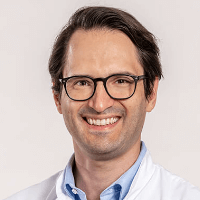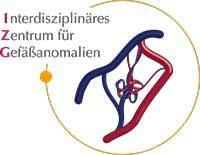Neuroendocrine Tumor (NET) of the Colon — Embolization or Chemoembolization: treatment in the Best Hospitals of Germany
Treatment prices are regulated by national law of the corresponding countries, but can also include additional hospital coefficients. In order to receive the individual cost calculation, please send us the request and medical records.

Department of Interventional Radiology
The Department of Interventional Radiology offers the full range of imaging examinations, as well as innovative image-guided minimally invasive techniques for the treatment of tumors, vascular diseases and internal pathologies (for example, CT, MRI, PET-CT, SPECT). The department's doctors have deep knowledge and colossal experience in the field of interventional radiological methods of treatment, which represent an excellent alternative to open surgical interventions. Despite the high level of technical equipment and the presence of advanced computerized systems, the focus is always on the person with his individual needs. Compliance with current clinical protocols and high professionalism of the department's specialists contribute to the successful clinical practice, as well as the reputability of the department among the best medical facilities of this kind in Germany.




Department of Interventional Radiology and Neuroradiology
The Department of Interventional Radiology and Neuroradiology offers a full range of advanced imaging diagnostics and minimally invasive treatments on both an inpatient and outpatient basis. The department has state-of-the-art medical equipment for imaging tests such as X-ray, computed tomography, magnetic resonance imaging, digital subtraction angiography, and mammography. The medical facility also performs many highly effective interventional therapeutic procedures under image guidance, which in many cases allow patients to avoid traumatic open surgery. For example, the department successfully performs local fibrinolysis, thrombectomy, percutaneous transluminal angioplasty, hemostasis, transarterial chemoembolization, uterine artery embolization, and other procedures. The department's neuroradiologists specialize in brain and spinal cord imaging and the treatment of central nervous system disorders. Interventional neuroradiology focuses on the treatment of carotid artery stenosis, brain aneurysms, arteriovenous malformations, dural fistulas, subdural hematomas, brain tumors, skull base and spinal tumors, and chronic back pain. The department's medical team has extensive clinical experience in their areas of expertise. The specialists are guided by the recommendations of the German Society for Interventional Radiology and Minimally Invasive Therapy (DeGIR) and the German Society for Neuroradiology (DGNR), which helps to achieve the best results.






Department of Adult and Pediatric Diagnostic, Interventional Radiology, Neuroradiology
The Department of Adult and Pediatric Diagnostic, Interventional Radiology, Neuroradiology is one of the best institutions of its kind in Germany and offers patients the full range of radiological studies and imaging-guided minimally invasive therapy. The department’s scope of tasks also includes imaging diagnostics in children of all age groups, detection and invasive treatment of cerebral vascular pathology (neuroradiology). Patient care is provided both on an inpatient and outpatient basis.






The large and small intestines are one of the main localizations of neuroendocrine tumors (NETs). In Germany, this cancer is treated with surgery and drug therapy, and advanced medical centers also offer chemoembolization. This therapeutic procedure helps control tumors or metastases in the liver at an advanced stage.
Content
- What are NETs?
- Standard treatments for NETs
- Embolization and chemoembolization
- How is chemoembolization performed?
- Where can I undergo treatment?
What are NETs?
Neuroendocrine tumors are neoplasms of varying grades that can produce hormones or biologically active amines. Up to 60% of neoplasms occur in the gastrointestinal tract. Of these, up to 9% of cases occur in the colon and 16% in the rectum. In general, however, these tumors are quite rare, accounting for up to 0.4% of all colorectal tumors.
NETs were previously called carcinoids. This is an obsolete name that has not been used in medicine since 2000.
Tumors of any location can be benign, intermediate, or malignant. They are designated as G1, G2, and G3. The grade is determined by the number of mitoses and the Ki-67 index. The more intensively the cells divide, the more aggressive the tumor.
Colon NETs are most often malignant. Poorly differentiated NETs in pathomorphological examination resemble adenocarcinoma, a common colon cancer. The disease as a whole is treated according to the same algorithm. At the same time, rectal NETs, although more common, are usually small and benign.
Standard treatments for NETs
Most patients undergo surgery for colon neuroendocrine tumor treatment. Operations are used at all stages, from the first to the last. Surgery provides the best survival rates for patients.
Treatment options for early-stage colon neuroendocrine tumors are as follows:
- Simple polypectomy
- Endoscopic mucosal resection
- Endoscopic submucosal dissection
These operations are performed using endoscopic techniques without any incisions in the abdomen. Minimally traumatic interventions provide a quick cure with a short rehabilitation period.
In cases of stage 2 or higher colon NETs, removal of part of the intestine along with the tumor is required. Surgeons at German medical centers perform surgical laparoscopic resection instead of open surgery. The best clinics in Germany also perform even safer robot-assisted operations (da Vinci treatment).
In advanced stages, cytoreductive surgery (CRS) is performed to remove all visible tumor foci, followed immediately by hyperthermic intraperitoneal chemotherapy (HIPEC).
Some patients receive somatostatin analogs, chemotherapy, and lutetium therapy after surgery.
Embolization and chemoembolization
The best hospitals for colon NET treatment in Germany are increasingly using embolization and chemoembolization. This is a blockage of the blood vessels that feed the tumor. Emboli that are injected into arteries may contain chemotherapy drugs. At the same time, there is no opposition between chemoembolization and surgery, so they can be used in combination.
Below are the cases in which the procedure can be used for colorectal NETs:
- Before surgery to remove a tumor in order to reduce blood loss
- In advanced stages of rectal cancer in order to combat rectal bleeding
- For liver metastasis control
Typically, even malignant NETs are less aggressive than intestinal adenocarcinoma. Therefore, the prognosis, even at the advanced stage, is much better. Many patients are considered candidates for surgery despite the appearance of distant metastatic lesions.
Patients with end-stage cancer often have liver metastases. In this case, the tumor itself in the intestine may be small. Whenever possible, doctors perform simultaneous resections of the intestine and liver, but this is a traumatic operation that cannot always be performed due to possible contraindications. In this situation, the optimal treatment option is intestinal resection in combination with hepatic artery chemoembolization. This procedure makes it possible to shrink metastatic tumors several times, sometimes tens of times, and in some patients, tumors in the liver may disappear completely.
How is chemoembolization performed?
The procedure is minimally invasive. It is performed under local anesthesia with intravenous sedation. The doctor makes an incision in the groin area to approach the femoral artery and perform the necessary manipulations from inside the blood vessels.
The catheter is delivered to the arterial network, supplying the tumor under X-ray guidance. The doctor injects a contrast agent to determine the type of blood supply. The target arteries are then blocked by emboli.
Depending on the purpose and type of procedure, solid particles, adhesive compositions, lipiodol solutions with chemotherapy drugs, and drug-saturated microspheres can be used as emboli.
After the administration of microspheres, the blood vessels feeding the tumor are blocked. As a result, cancer cells are deprived of blood supply and die. Regional chemotherapy complements the therapeutic effect. Drugs that suppress tumor growth are released from drug-saturated microspheres over a long period of time.
Where can I undergo treatment?
You can undergo your diagnostics and neuroendocrine tumor treatment in Germany. The Booking Health website presents the country's leading hospitals. On the website, you can also find out the current cost of treatment in Germany and make an appointment at a clinic at the best price.
Authors:
The article was edited by medical experts, board-certified doctors Dr. Nadezhda Ivanisova and Dr. Vadim Zhiliuk. For the treatment of the conditions referred to in the article, you must consult a doctor; the information in the article is not intended for self-medication!
Sources:

